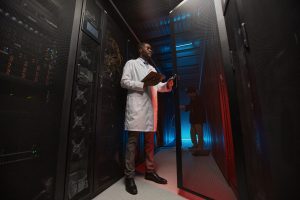Elon Musk’s artificial intelligence venture, xAI, is set to undertake a monumental expansion of its supercomputer, Colossus, located in Memphis, Tennessee. The plan involves increasing the system’s capacity from its current 100,000 graphics processing units (GPUs) to over one million, positioning it as one of the most formidable AI supercomputers globally. This strategic move aims to elevate xAI’s standing in the competitive AI landscape, challenging industry leaders such as OpenAI, Google, and Anthropic.
Strategic Collaborations and Infrastructure Development
To facilitate this expansion, xAI is partnering with leading technology firms. Nvidia, renowned for its advanced GPU technology, will supply the necessary hardware. Dell Technologies and Super Micro Computer are tasked with assembling the server racks that will house these GPUs. These collaborations are expected to establish operations in Memphis, contributing to the local economy and technological infrastructure. The project’s financial scope is substantial, with costs projected to reach tens of billions of dollars, encompassing hardware acquisition and infrastructure maintenance.
Accelerated Development and Competitive Positioning
The initial construction of Colossus was completed in an impressive timeframe of just 122 days, bringing the system online with 100,000 Nvidia H100 GPUs. This rapid development underscores xAI’s commitment to swiftly advancing its AI capabilities. The forthcoming expansion is poised to enhance xAI’s computational power further, enabling more sophisticated AI model training and application development. This initiative reflects Musk’s strategy to build self-reliant supercomputing capacity, contrasting with rivals who form resource partnerships.
Environmental Considerations and Community Impact
The massive scale of the Colossus expansion has prompted environmental concerns, particularly regarding energy consumption and potential emissions. Activists and lawmakers have scrutinized the growing number of data centers for their vast energy consumption. In August, the Southern Environmental Law Center called on local Tennessee officials to verify whether xAI was using gas turbines to help power its supercomputer without the required air permits.
Implications for the AI Industry
The expansion of Colossus signifies a pivotal development in the AI sector, highlighting the escalating competition among tech giants to build more powerful AI infrastructure. By significantly enhancing its computational resources, xAI aims to accelerate the development of advanced AI models, thereby strengthening its position in the market. This move also reflects a broader industry trend towards self-reliant AI infrastructure, with companies like Google and OpenAI also developing custom chips.
Elon Musk’s ambitious plan to expand the Colossus supercomputer tenfold underscores xAI’s commitment to advancing artificial intelligence capabilities. While this development holds promise for technological innovation, it also necessitates careful consideration of environmental impacts and community engagement to ensure sustainable growth. As xAI progresses with the expansion, balancing technological advancement with environmental stewardship will be crucial to its success and acceptance within the broader community.




